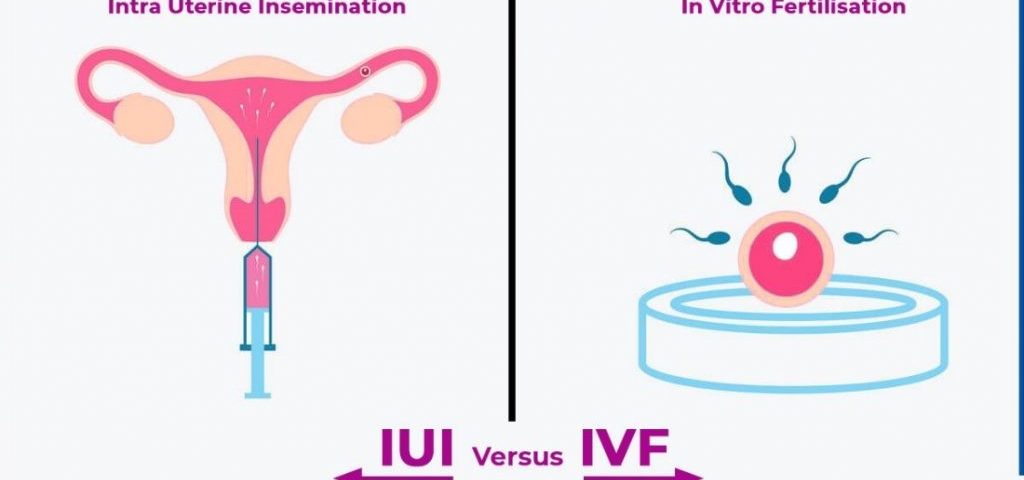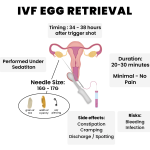
Does a Doctor Perform Egg Retrieval for IVF in Georgia?
April 18, 2025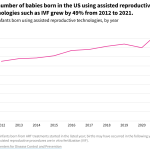
How Many Births Are From IVF? A Deep Dive Into the World of In Vitro Fertilization
April 19, 2025The Difference Between IUI and IVF: A Deep Dive into Fertility Treatments
When you’re dreaming of starting a family but facing challenges, terms like IUI and IVF might pop up in conversations with doctors or friends. These two fertility treatments—intrauterine insemination (IUI) and in vitro fertilization (IVF)—are like the superheroes of the baby-making world, each with its own powers and quirks. But what’s the real difference between them? How do they work, and which one might be your perfect match? In this article, we’re pulling back the curtain on IUI and IVF, digging into the details that don’t always make it to the headlines. Expect some surprises—like secret side effects, hidden costs, and even the latest science breakthroughs—plus practical tips to help you navigate this journey with confidence.
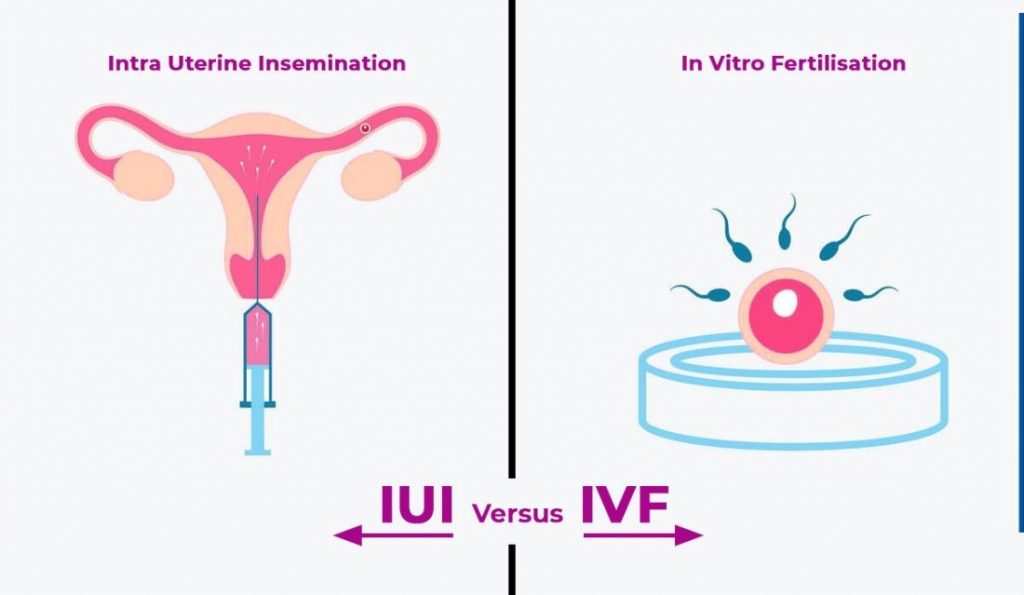
What Are IUI and IVF? The Basics Made Simple
Let’s start with the big picture. IUI and IVF are both ways to help people get pregnant when nature needs a little nudge. They’re part of a group called assisted reproductive technologies (ART), but they tackle the problem in totally different ways.
- IUI (Intrauterine Insemination): Think of IUI as giving sperm a VIP pass to the egg. Doctors take a sperm sample, clean it up to keep only the best swimmers, and use a tiny tube (catheter) to place it right into the uterus. This happens around ovulation—the time when an egg is ready to meet its match. It’s quick, simple, and happens inside your body, just like regular conception.
- IVF (In Vitro Fertilization): IVF is more like a sci-fi movie. Doctors use medicine to help your ovaries make lots of eggs, then take those eggs out with a small procedure. In a lab, they mix the eggs with sperm to create embryos (baby beginnings). After a few days, one or more embryos get placed back into the uterus to grow. It’s a bigger process, but it gives doctors more control.
So, the main difference? IUI keeps fertilization inside you, while IVF does it outside in a lab. But there’s so much more to unpack—let’s dive deeper!
How IUI Works: A Step-by-Step Look
IUI might sound fancy, but it’s pretty straightforward. Here’s what happens, step by step:
- Tracking Ovulation: Your doctor figures out when you’re ovulating—usually 10-16 days after your period starts. They might use an at-home kit to spot a hormone surge or check your ovaries with an ultrasound.
- Sperm Prep: On the big day, your partner (or a donor) provides a sperm sample. The lab “washes” it, removing slowpokes and boosting the best sperm.
- The Procedure: You lie on an exam table, feet in stirrups (yep, like a regular checkup). The doctor slides a thin catheter through your cervix and releases the sperm into your uterus. It takes 5-10 minutes—no anesthesia needed.
- Waiting Game: After, you rest for a bit, then go home. Two weeks later, a pregnancy test tells you if it worked.
Fun Fact Fans Love
Did you know some clinics play calming music during IUI to ease nerves? One study even found that patients who listened to their favorite tunes felt less stressed—imagine picking your playlist for the moment sperm meets egg!
What It Feels Like
Most people say it’s like a pap smear—maybe a little cramping, but not a big deal. “It was over before I could finish worrying about it,” says Dr. Mindy Christianson, a fertility expert at Johns Hopkins. That’s a relief for anyone scared of needles or surgery!
How IVF Works: A Behind-the-Scenes Tour
IVF is a bigger adventure—think of it as a multi-level quest. Here’s the rundown:
- Egg Boosting: For about 10-14 days, you take hormone shots to make your ovaries produce lots of eggs (aiming for 10-15). You’ll visit the clinic for ultrasounds and blood tests to check progress.
- Egg Retrieval: When the eggs are ready, you get light sedation (you’re asleep but breathing on your own). A doctor uses a needle through your vagina to grab the eggs—takes about 10-20 minutes.
- Lab Magic: In a lab, sperm and eggs meet. Sometimes they’re just mixed together; other times, a single sperm gets injected into an egg (called ICSI). Embryos grow for 3-5 days.
- Embryo Transfer: The doctor picks the healthiest embryo(s) and places them in your uterus with a catheter. You might rest for a day or two after.
- The Wait: Two weeks later, a blood test checks for pregnancy.
Insider Scoop
Ever wonder what embryologists do all day? They’re like babysitters, watching embryos under microscopes and cheering for the strongest ones. Some even name them—secretly, of course!
What It Feels Like
The shots sting a bit, and egg retrieval might leave you sore for a day. The transfer? Similar to IUI—just a quick pinch. But the emotional rollercoaster? That’s the real ride.
IUI vs. IVF: Key Differences That Matter
Now that you know the steps, let’s compare the big stuff—cost, time, invasiveness, and more. Here’s a handy table to break it down:
| Factor | IUI | IVF |
|---|---|---|
| Where Fertilization Happens | Inside your body | In a lab |
| Time per Cycle | About 2-4 weeks | About 4-6 weeks |
| Cost per Cycle | $300-$4,000 | $12,000-$18,000 |
| Invasiveness | Low (no surgery) | Higher (shots, egg retrieval) |
| Success Rate | 5-20% per cycle | 40-50% per cycle (under 35) |
| Medications | Optional (pills or shots) | Required (lots of shots) |
Hidden Gems Fans Dig
- IUI Bonus: Some couples swear by “double IUI”—two inseminations in one cycle. Research is mixed, but a 2023 study hinted it might boost odds by 5% for certain cases.
- IVF Perk: Extra embryos can be frozen for later. One mom on a fertility forum said, “It’s like having a backup plan in the freezer—I had twins years apart from one cycle!”
Who’s a Good Fit for IUI?
IUI isn’t for everyone, but it’s a great first step for some. Here’s who might love it:
- Couples with Mild Issues: Low sperm count, slow swimmers, or tricky cervical mucus? IUI gives sperm a shortcut.
- Single Moms or Same-Sex Couples: Using donor sperm? IUI’s simplicity makes it a fan favorite.
- Unexplained Infertility: When doctors can’t pinpoint the problem, IUI’s a low-key way to try.
Practical Tips
✔️ Boost Your Odds: Track ovulation with an app—timing is everything.
❌ Don’t Overdo It: More than 3-6 cycles might mean it’s time to rethink—success drops after that.
Science Says
A 2024 study found IUI works best for women under 35 with no major fertility blocks—like blocked tubes or severe endometriosis. Success tops out at 20% per cycle for this group.
Who’s a Good Fit for IVF?
IVF is the heavy hitter, perfect for tougher challenges. Check out who it’s made for:
- Blocked Tubes: If your fallopian tubes are out of commission, IVF skips them entirely.
- Severe Male Infertility: Super low sperm count? IVF with ICSI (sperm injection) can save the day.
- Older Age: Over 35? IVF’s higher success rates make it a go-to.
- Failed IUI: Tried IUI a few times with no luck? IVF steps up the game.
Practical Tips
✔️ Freeze Extras: Save embryos for future kids—it’s cheaper than starting over.
❌ Don’t Rush: Take a break between cycles if you need it—stress can mess with results.
Science Says
The Society for Assisted Reproductive Technology (SART) reports a 49% live birth rate per IVF cycle for women under 35 (2022 data). That drops with age, but it’s still a powerhouse.
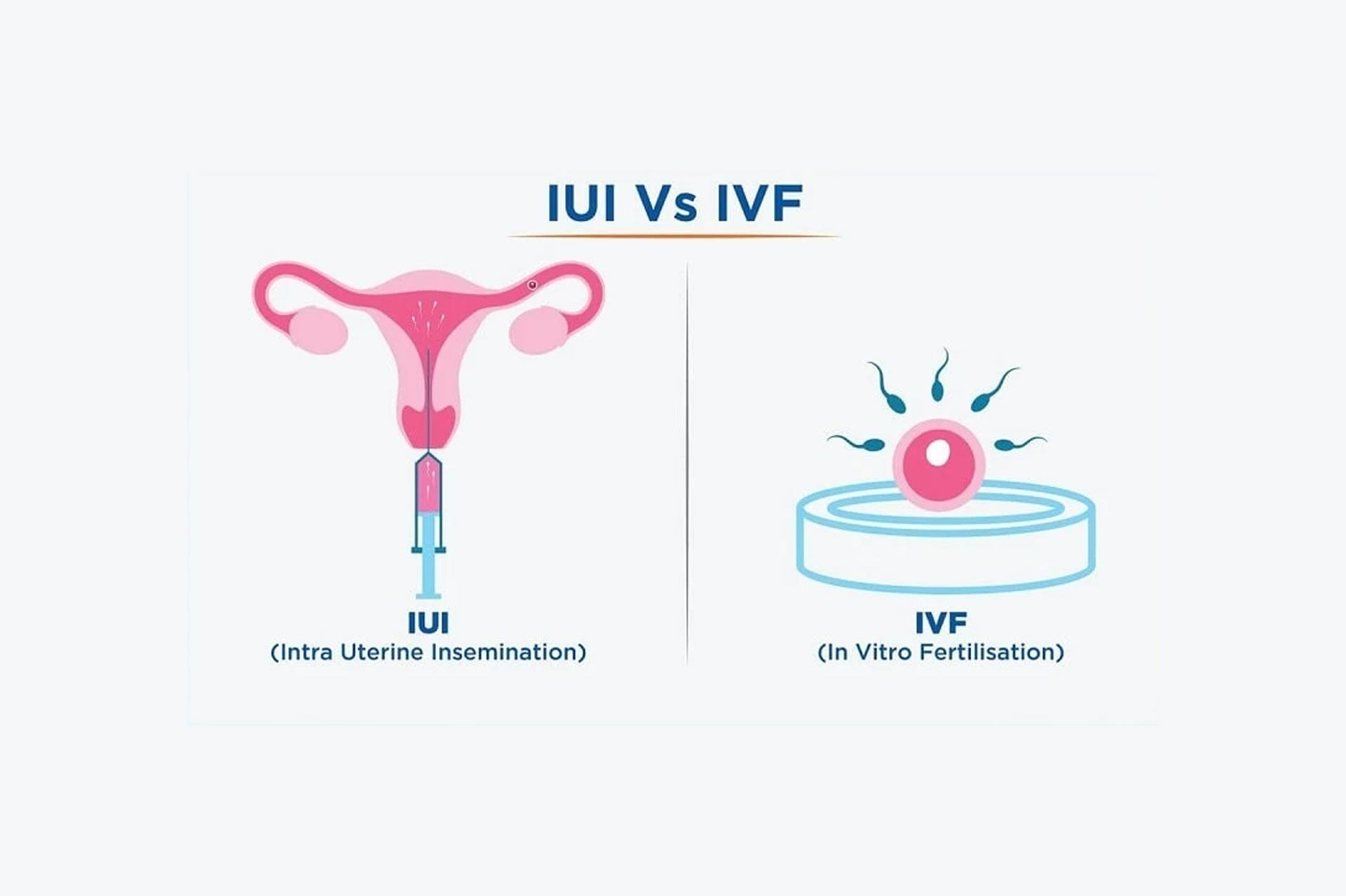
Success Rates: What’s Realistic?
Success is the golden question—will it work? Here’s the scoop:
- IUI Success: Ranges from 5-20% per cycle. Younger folks with mild issues do best. After 3 tries, odds flatten out.
- IVF Success: Hits 40-50% per cycle for under-35s, per SART’s latest stats. It dips to 10-20% over 40, but still beats IUI.
What Fans Want to Know
Ever heard of “IVF twins”? It’s not just luck—multiples happen in 1-13% of medicated IUI cycles and about 1% of single-embryo IVF transfers. Twins sound cute, but they come with higher risks like prematurity.
Latest Research
A 2024 study in Fertility and Sterility found IVF with genetic testing (PGT) bumps success by 10-15% for women over 38. IUI? No such upgrade—its limits are baked in.
Costs: Breaking Down the Price Tag
Money talks, and fertility treatments aren’t cheap. Let’s look at the numbers:
- IUI Costs: $300-$4,000 per cycle. No meds? Closer to $300. Add pills or shots, and it climbs.
- IVF Costs: $12,000-$18,000 per cycle. That’s for the basics—egg retrieval, lab work, transfer. Freezing embryos or genetic testing? Add $2,000-$5,000.
Hidden Costs Fans Miss
- IUI Surprise: Multiple cycles add up. Three tries could hit $12,000—half an IVF cycle!
- IVF Secret: Insurance might cover parts (like meds) in some states. Check yours—17 states mandate coverage.
Money-Saving Tips
✔️ Ask About Discounts: Some clinics offer IUI packages (3 cycles for less).
✔️ Finance IVF: Look into loans or grants— Resolve.org lists options.
❌ Don’t Skimp: Cheap clinics might cut corners—quality matters.
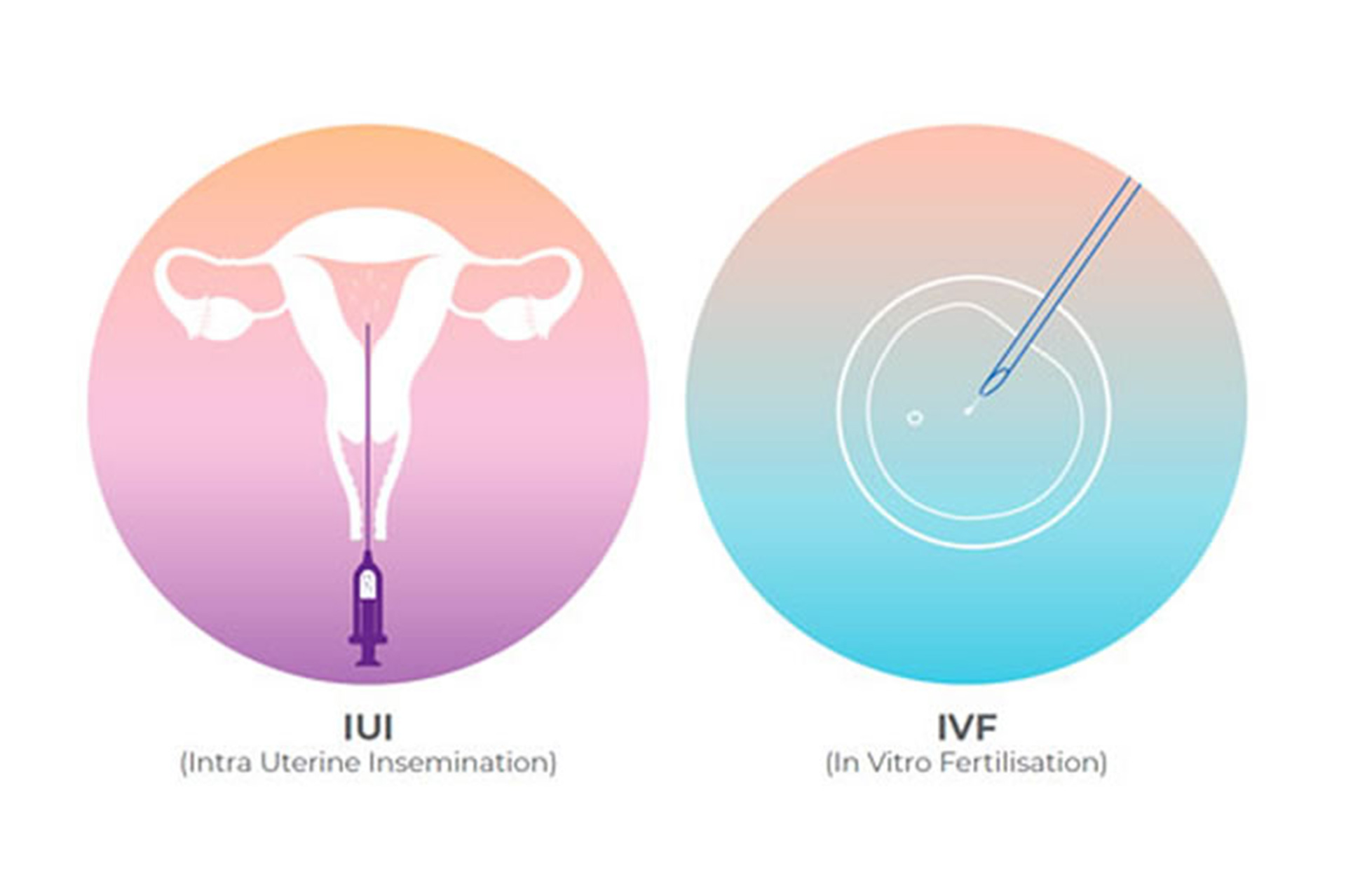
Risks and Side Effects: What They Don’t Tell You
Every superhero has a weakness, right? Here’s what to watch for:
IUI Risks
- Multiples: Meds can mean twins or more (1-32% chance, depending on drugs). Risky for mom and babies.
- Cramping: Mild, but real—think period pains.
- Infection: Rare, but possible if tools aren’t sterile.
IVF Risks
- Ovarian Hyperstimulation (OHSS): Too many eggs can swell ovaries (1-5% of cases). Painful, but treatable.
- Surgery Risks: Egg retrieval might cause bleeding or infection (less than 1%).
- Emotional Toll: Shots, waiting, hoping—it’s a lot.
Insider Tip
“IVF’s physical side effects get attention, but the mental strain is just as real,” says Dr. Devora Aharon from RMA of New York. Journaling or therapy can help.
The Emotional Journey: What It’s Really Like
Fertility treatments aren’t just about your body—they hit your heart, too. Here’s the raw truth:
- IUI Feels: Quick hope, quick letdown if it fails. Less prep means less buildup, but repeated tries wear you down.
- IVF Feels: A marathon. Daily shots and big hopes can lift you up—then crash hard if it doesn’t work.
Fan-Favorite Stories
One couple shared on X how they turned IUI waits into “date nights”—pizza and movies to keep spirits high. Another IVF mom said naming her embryos (like “Peanut”) made the process feel personal.
Coping Tips
✔️ Lean on Friends: Share with someone who gets it—online groups rock.
❌ Don’t Isolate: Hiding hurts more—talk it out.
IUI vs. IVF: Which Should You Choose?
Choosing feels huge, but it’s about your story. Here’s a guide:
- Pick IUI If: You’re younger, have mild issues, or want a simpler start. It’s less invasive and cheaper upfront.
- Pick IVF If: You’ve got big hurdles (blocked tubes, low sperm), failed IUI, or want higher odds fast.
Questions to Ask Your Doc
- What’s my specific issue—will IUI even work?
- How many cycles should I try before switching?
- Any new tricks (like PGT) that could help?
Expert Insight
“IUI’s a great first step, but IVF’s control makes it unbeatable for complex cases,” says Dr. Angeline Beltsos of Kindbody. Your doc’s your compass here.
Latest Trends: What’s New in 2025?
Fertility science moves fast—here’s what’s hot now:
- IUI Boost: A 2024 trial tested “sperm priming”—tweaking sperm in the lab before IUI. Early results show a 7% success bump.
- IVF Upgrade: AI now picks the best embryos, cutting guesswork. Clinics report a 10% success boost since 2023.
- Cost Cuts: Mini-IVF (fewer meds) is trending—$5,000-$8,000 per cycle with solid results for some.
Fan Buzz
X users rave about “natural IVF”—less drugs, more chill. One said, “It’s like IVF lite—I felt human again!”
Real-Life Stories: IUI and IVF in Action
Let’s meet two folks who’ve been there:
- Jess, 29 (IUI): “My husband’s sperm was slow, so we tried IUI. Third time worked—our son’s 2 now. It was cheap and easy, but waiting each time was brutal.”
- Mark, 37 (IVF): “My wife’s tubes were blocked—IVF was our shot. One cycle, one girl. The shots sucked, but seeing her embryo on screen? Magic.”
Takeaway
Both paths can lead to a baby—your journey’s unique.
Your Next Steps: Making It Happen
Ready to roll? Here’s how to start:
- Talk to a Specialist: Get tests—sperm, eggs, tubes. Know your odds.
- Plan Finances: Budget for at least 3 IUI cycles or 1 IVF round.
- Prep Your Body: Eat well, sleep lots, cut stress—research says it helps.
- Pick a Team: Find a clinic with good vibes and stats (check SART.org).
Final Tip
Start with hope, not pressure. Every step’s a win.
Let’s Chat: What’s Your Take?
IUI or IVF—which sounds more your speed? Got a question we didn’t cover? Drop it below—let’s keep this convo going! Share your story, too—your words might light someone else’s way.
